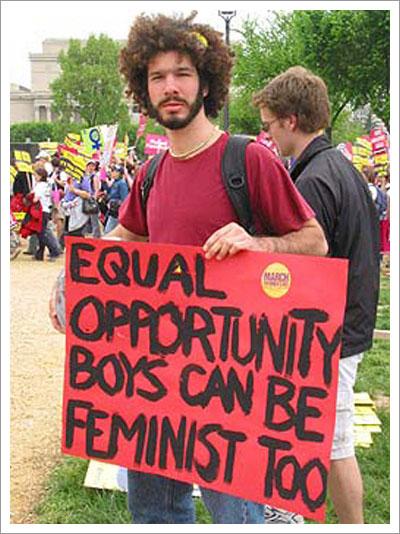by Change Maker, Alex Tan
 Not long ago, I had a discussion with my friends about feminism. Their reactions to my internship at AWARE were predictably lukewarm. They informed me that while they were “all for gender equality”, they felt that the feminist movement today runs contrary to the ideal of equality. In their opinion, it actually aims to shift the power imbalance in favour of women by “bashing men up”. It is easy to dismiss these views, but exhausting to fully explain how problematic and ridiculous they are. In this post, I will address three common misconceptions and their flawed assumptions.
Not long ago, I had a discussion with my friends about feminism. Their reactions to my internship at AWARE were predictably lukewarm. They informed me that while they were “all for gender equality”, they felt that the feminist movement today runs contrary to the ideal of equality. In their opinion, it actually aims to shift the power imbalance in favour of women by “bashing men up”. It is easy to dismiss these views, but exhausting to fully explain how problematic and ridiculous they are. In this post, I will address three common misconceptions and their flawed assumptions.
Myth: Feminists are reverse sexists.
Granted, men can be victims of prejudice, just as women can. But sexism is systemic oppression. Reverse sexism does not exist because the unequal status of women is institutional and deeply entrenched. For example, in Singapore at present, there are only 18 elected female Members of Parliament out of a total of 84 elected members. Only 7.3% of board positions are held by women. There is a lack of female representation in political, socio-economic and military institutions. This means that even if a woman feels prejudice towards a man, she is powerless to institutionalise this feeling the way men can. Sexism and misogyny therefore do not happen in a vacuum. They take place alongside pervasive culturally-reinforced messages of inherent female inferiority. As such, prejudices against men cannot be considered sexism, given that men already enjoy privileges on a structural level by virtue of having been born male.
Myth: Feminism aims to establish a matriarchy.
 This is based on the misunderstanding that feminism ignores men’s issues simply because the focus is on women’s rights. Feminism creates a space of female solidarity and gives voice to women in a world already dominated by male narratives. It would be indecent and oppressive for men to demand attention when they already benefit due to existing power structures. Furthermore, feminism is not completely disconnected from men’s issues because it seeks to eliminate gendered expectations and roles which also affect men. In Singapore, National Service is compulsory and male-exclusive for citizens and permanent residents. Evidently, not everyone has military aspirations or capabilities suited to National Service. Forcing it onto men who will not find it fulfilling is unfair, but so is excluding women who will find it meaningful.
This is based on the misunderstanding that feminism ignores men’s issues simply because the focus is on women’s rights. Feminism creates a space of female solidarity and gives voice to women in a world already dominated by male narratives. It would be indecent and oppressive for men to demand attention when they already benefit due to existing power structures. Furthermore, feminism is not completely disconnected from men’s issues because it seeks to eliminate gendered expectations and roles which also affect men. In Singapore, National Service is compulsory and male-exclusive for citizens and permanent residents. Evidently, not everyone has military aspirations or capabilities suited to National Service. Forcing it onto men who will not find it fulfilling is unfair, but so is excluding women who will find it meaningful.
However, making National Service compulsory for women as well will not bring any resolution. Instead, a possible solution would be to make it optional for both men and women. Not only does that achieve equality of choice for both sexes, it also discourages the narrow-minded notion that serving in the military is the singular standard by which contribution to the country should be judged. Similarly, rather than expose women to the punitive measure of caning, we should ban the practice entirely. I support AWARE’s stance: “Neither men nor women deserve to suffer from caning. Our stand is not that this practice be extended to include women, but rather that caning be abolished completely”. Violating more human rights as a means to achieve gender equality seems to me both ironic and hypocritical.
Myth: Feminists are un-feminine, unmarried women.
Other than this being an obviously inaccurate generalization, it is further problematic because it suggests that a woman must be feminine and/or married and implies that femininity and feminist ideals are mutually exclusive. It also perpetuates the damaging idea that a woman’s identity is only valid if she is married to a man. Needless to say, this erases personal agency and objectifies women.
Sometimes I think about the multiple questions associated with being a male feminist, as brilliantly articulated by Arthur Chu here. I dream of a world in which everyone is not socially defined by their gender, but is instead treated with the dignity that human beings deserve.
At the heart of feminism is the freedom of individual expression regardless of whether that image fits society’s restrictive standards. Feminism disregards and rises above those standards. What comes to mind is a quote by journalist Helen Lewis: “The comments on any article about feminism justify the existence of feminism.” Until the day that feminists will no longer receive backlash for fighting for gender equality and social change, feminism remains urgently necessary.
 About the Author: Alex likes many things, like Virginia Woolf, Welcome to Night Vale, Eternal Sunshine of the Spotless Mind, Arcade Fire, blogs that criticize what’s problematic in pop culture, articles about the tensions of postcoloniality, any form of media that subverts narrative tropes and long words (e.g. omphaloskepsis) that he probably will only ever use once in a pretentious poem that he has yet to write. Oh, and he is also a feminist.
About the Author: Alex likes many things, like Virginia Woolf, Welcome to Night Vale, Eternal Sunshine of the Spotless Mind, Arcade Fire, blogs that criticize what’s problematic in pop culture, articles about the tensions of postcoloniality, any form of media that subverts narrative tropes and long words (e.g. omphaloskepsis) that he probably will only ever use once in a pretentious poem that he has yet to write. Oh, and he is also a feminist.
